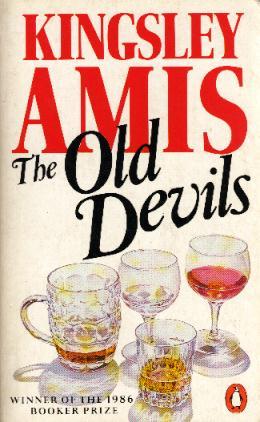
Kingsley Amis
The following novels constitute the shortlist for the 1986 Booker Prize:
Notable Omissions from the 1986 Shortlist

|
The Old Devils Kingsley Amis |
Dustjacket synopsis:
"Malcolm, Peter and Charlie and their Soave-sodden wives have one main ambition left in life:
to drink Wales dry. But their routine is both shaken and stirred when they are joined by
professional Welshman Alun Weaver (CBE) and his wife, Rhiannon, returning to their
Celtic roots..."
Quotes:
"A bloody funny lovely bloody book...A genius at full throttle" - Financial Times
"There is one old devil who is writing better than he ever did" - Anthony Burgess, The Observer
"In these explicit days, Mr Amis is the laureate of the unsayable, the literary it
man" - Sunday Telegraph
"Crackling with marvellous taff comedy...this is probably Mr Amis's best book since
Lucky Jim" - Guardian
"Amis has turned grumpiness into an art form, comic petulance into a window through which many
more important emotions can be viewed" - Today
"Mr Amis's prose has perpetual gusto and zest that are irrestible...A triumph" - Scotsman
First Paragraph:
'If you want my opinion', said Gewen Cellan-Davies, 'the old boy's a terrificially distinguished citizen of Wales. Or at any rate what passes for one these days.'Her husband was cutting the crusts off a slice of toast. 'Well, I should say that's generally accepted.'
'And Reg Burroughs is another after his thirty years of pen-pushing in first City Hall and later County Hall, for which he was duly honoured.'
From the Penguin paperback edition, 1987.
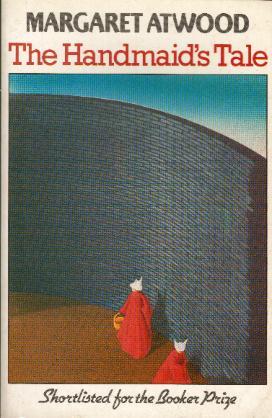
|
The Handmaid's Tale Margaret Atwood |
Dustjacket synopsis:
"Offred is a national resource. In the Republic of Gilead her viable ovaries make her a
precious commodity, and the state allows her only one function: to breed. As a Handmaid she
carries no name except her Master's, for whose barren wife she must act as a surrogate. But
Offred cannot help remembering subversive details of her former life: her mother, her lover,
her child, her real name, woman having jobs and being allowed to read, fun, 'freedom'.
Dissenters are supposed to end up either at the Wall, where they are hanged, or in the
Colonies, to die a lingering death from radiation sickness. But the irrepressible Moira
shows Offred that it is possible to cheat the system...
"The Handmaid's Tale is a scathing satire and a dire warning. Margaret Atwood, Canada's most distinguished poet, novelist and critic, has written a masterpiece."
First Paragraph:
We slept in what had once been the gymnasium. The floor was of varnished wood, with stripes and circles painted on it, for the games that were formerly played there; the hoops for the basketball nets were still in place, though the nets were gone. A balcony ran around the room, for the spectators, and I thought I could smell, faintly like an afterimage, the pungent scent of sweat, shot through with the sweet taint of chewing gum and perfume from the watching girls, felt-skirted as I knew from pictures, later in mini-skirts, then pants, then in one earring, spiky green-streaked hair. Dances would have been held there; the music lingered, a palimpest of unheard sound, style upon style, an undercurrent of drums, a forlorn wail, garlands made of tissue-paper flowers, cardboard devils, a revolving ball of mirrors, powdering the dancers with a show of light.
From the Virago paperback edition, 1987.

|
Gabriel's Lament Paul Bailey |
Quotes:
"Gabriel Harvey's mother wanted an angel, and her son was happy to oblige. But she mysteriously
abandoned him, and he remained trapped in a twenty-eight-year adolescence and fettered to an
unexpressed grief. The discovery and naming of that grief is the subject of this most
original novel...touching, beautifully paced and sustained, and quite unforgettable" - Literary Review
"At once comic and desperately tragic...a novel which draws you with a strong, sure touch
into its web of family life, deceit and counter deceit, love in spite of all" - Sunday Telegraph
"The best novel yet by one of the most careful fiction craftsmen of his generation. See how
Dickensianly it grips from that sombrely punning first sentence...through all the plot's
ominous twitches and turns to the double bereavement, actual and psychic, of its conclusion:
a masterly tribute in its own voice to our Shakespeare of the novel" - Guardian
"Rich, ebullient and essentially comic...one of the half-dozen most enjoyable novels to have
come my way this year" - Spectator
"A magnificent novel, moving, eccentric and unforgettable. He has a rare feeling for language
and an understanding of character which few can rival" - Daily Telegraph
First Paragraph:
I came to grief late in life - when I was forty, in Minnesota. The distress I almost failed to bear during the long nights of that hot summer was my legacy, I suppose. There are times, even now, I consider it my rightful inheritance.
'I'm leaving you something,' my father announced, from what I hoped would be his death-bed.
I reminded him, yet again, that I neither wanted nor needed his money.
'That's gone where my legs went. I'd be surprised if there's much more than a brass farthing and an old collar stud in the kitty. No, my son, I wouldn't insult you with filthy lucre. Others, yes, but not you.'
I thanked him for having my interests at heart.
From the Penguin paperback edition, 1987.
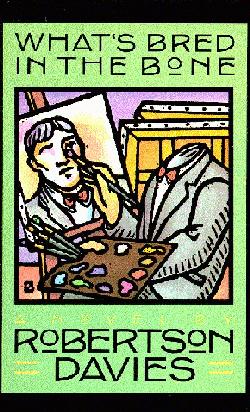
|
What's Bred in the Bone Robertson Davies |
Dustjacket synopsis:
"Robertson Davies has written more than two dozen books, among which are the celebrated novels
that make up "the Deptford Trilogy" - Fifth Business, The Manticore and
World of Wonders. Rebel Angels and What's Bred in the Bone are, similarly,
linked but entirely independent novels."
First Paragraph:
"The book must be dropped."
"No, Arthur!"
"Perhaps only for a time. But for the present, it must be dropped. I need time to think."
The three trustees in the big penthouse drawing-room were beginning to shout, which destroyed all atmosphere of a business meeting - not that such an atmosphere had ever been strong. Yet this was a business meeting, and these three were the sole members of the newly founded Cornish Foundation for Promotion of the Arts and Humane Scholarship. Arthur Cornish, who was pacing up and down the room, was unquestionably a business man; a Chairman of the Board to his business associates, but a man with interests that might have surprised them if he had not kept his life in tidy compartments. The Reverend Simon Darcourt, pink, plump, and a little drunk, looked precisely what he was: a priest-academic pushed into a tight corner. But the figure least like a trustee of anything was Arthur's wife Maria, barefoot in gypsy style, and dressed in a housecoat that would have been gaudy if it had not been made by the best couturier of the best materials.
From the Viking paperback edition, 1985.
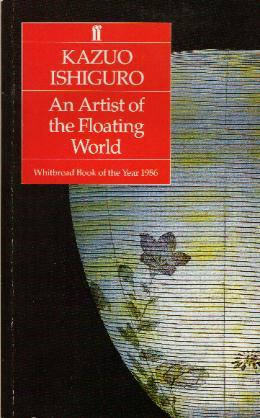
|
An Artist of the Floating World Kazuo Ishiguro |
Dustjacket synopsis:
"World War II is over and Japan sets about rebuilding her shattered cities; Masuji Ono, an ageing painter, looks back over his life and assesses a career that coincided with the rise of Japanese militarism. With subtlety and control, Kazuo Ishiguro writes about art and politics, ambition and integrity, past and present."
Quotes:
"An exquisite novel" - Observer
"A work of spare elegance, refined, understated, economic" - Sunday Times
"A work of precision and nuance...This is one of the best and most finely finished novels I
have read for some time" - Malcolm Bradbury, Vogue
"Mr Ishiguro's prose, polished and lucid, captures with real truth the garrulous qualities of an
old man's narrative...For a young writer, he sees life through the eyes of the old with
amazing conviction" Daily Telegraph
First Paragraph:
If on a sunny day you climb the steep path leading up from the little wooden bridge still referred to around here as 'the Bridge of Hesitation', you will not have to walk far before the roof of my house becomes visible between the tops of two gingko trees. Even if it did not occupy such a commanding position on the hill, the house would still stand out from all others nearby, so that as you come up the path, you may find yourself wondering what sort of wealthy man owns it.
But then I am not, nor have I ever been, a wealthy man. The imposing air of the house will be accounted for, perhaps, if I inform you that it was built by my predecessor, and that he was none other than Akira Sugimura. Of course, you may be new to this city, in which case the name of Akira Sugimura may not be familiar to you. But mention it to anyone who lived here before the war and you will learn that for thirty years or so, Sugimura was unquestionably amongst the city's most respected and influential men.
From the Faber and Faber paperback edition, 1988.
Notes:
This novel won the Whitbread Book of the Year and Novel Awards for 1986.
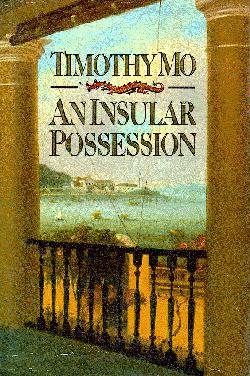
|
An Insular Possession Timothy Mo |
Dustjacket synopsis:
"Canton 1833. Walter Eastman and Gideon Chase, young Americans working in the 'Factories' - the
home of the East India Company on the south China coast - are at loggerheads with the
European community which thrives on the opium trade. When Eastman is fired, he and Chase
establish an irreverent weekly paper, The Lin Tin Bulletin and River Bee, chronicling
local business dealings, political events and the fashionable social life in nearby Macao. In
their writing - particularly in their attacks on their rival paper, the conservative
Canton Monitor - our two buccaneers show a flamboyance and crusading zeal which is
shared by their friends and supporters: the bibulous painter O'Rourke, the river pirate
Remedios and the Jesuit Ribeiro from whom Chase secretly takes lessons in Chinese.
"When the first Opium War breaks out their lives grow increasingly dangerous and diverse: Chase is enrolled as an interpreter and becomes an unwilling witness to battle; O'Rourke and Eastman (obsessed with the recently developed daguerreotype) contest the most telling means of recording suffering. Following the three men, we see the white Cantonese community pack its bags and move to Hong Kong - to found a new trading empire on the ashes of the old.
"An Insular Possession has extraordinary scope and fascination. Its huge panorama - reflected in newspaper extracts, letters and diaries - wonderfully conveys the tone and ethos of the period, and combines the excitement of an adventure story with the wit of a comedy of manners and the intelligence of a first-class historical novel. The quick-witted Eastman, the fastidious Chase and the licentious O'Rourke show us a world which is multi-faceted, marvellously detailed and potently dramatic. The novel is a dazzling achievement by one of our finest writers."
First Paragraph:
The river succours and impedes native and foreigner alike; it limits and it enables, it isolates and it joins. It is the highway of commerce and it is a danger and a nuisance. Children fall off fragile native craft; drunken sailors topple from the decks of the Company's chequered ships. Along with the rest of the city's effluvia the river sweeps the victims out to sea. Thus for centuries it has fulfilled the functions of road and, as rivers will, cloaca. It appearance changes, if not its uses. Most often the water is a sullen grey. At its mouth it stains the clean blue sea yellow-brown, the colour of tea as drunk in London. Somewhere, at its source, the water must run pellucid from some untainted spring. Logic dictates this. Practice, as always, is another matter. Where the river rises thousands of miles inland it seems already pregnant - with silt, with life, and with the opposite of life. For here already are bodies, though not the stalwart corpses of the foreign sailors down the stream, but those of babies, victims of the prevalent cult of infanticide. Most are female. Here, in the backlands, the landscape is bleak and sterile, as of a world never properly born. The river winds a sinuous course through lazy, rumpled hills, thinly covered with scrub and here and there some crazy, crooked conifer stark against that margin where sky silhouettes hill-edge. There are no habitations especially evident, although it is the foraging human hand which has left these hills so bare of wood. Bandits make their lairs here in artful caverns or concealed depressions where their settlements lie unseen from the river. Otherwise, there are a few hardy charcoal-burners, half brigand themselves, whose lonely fires wink at night on the slopes.
From the Chatto and Windus hardback edition, 1986.
Notable Omissions from the Shortlist:
"Mefisto", John Banville
"Xorandor", Christine Brooke-Rose
"Continent", Jim Crace
"Redhill Rococo", Shena Mackay
"A Dark-Adapted Eye", Barbara Vine (Ruth Rendell)
This page and its contents are copyright © 2002 by Perry Middlemiss, Melbourne, Victoria, Australia.
Last modified: April 16, 2002.